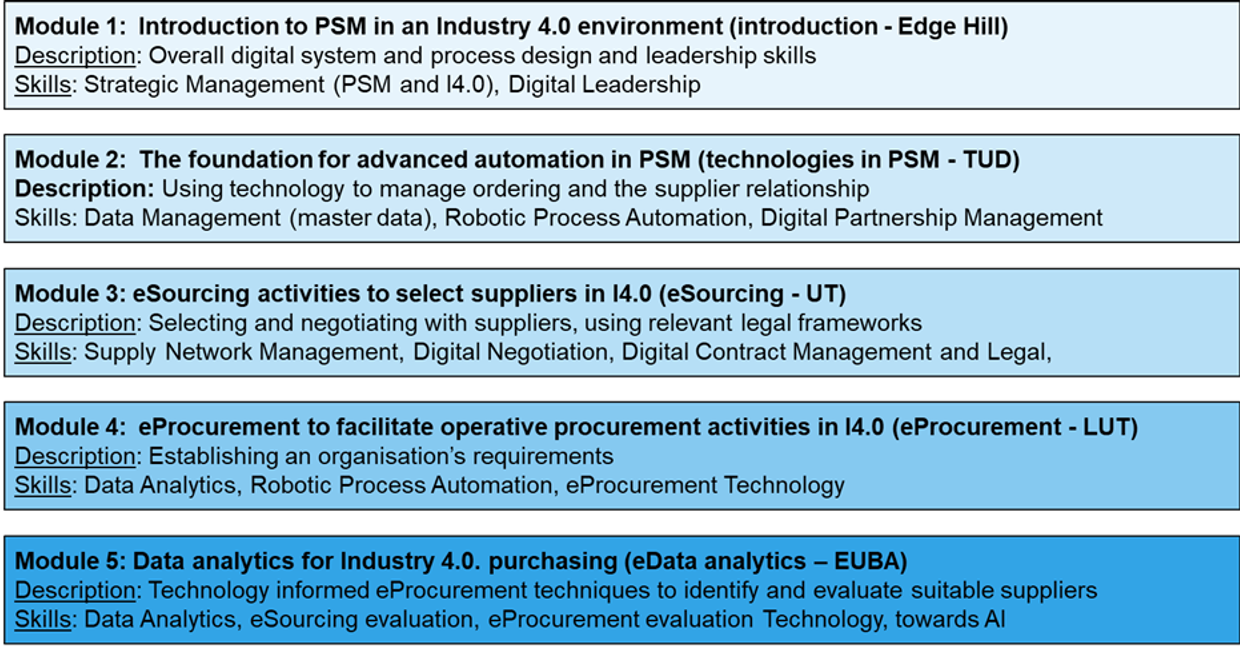Design of module-based course concept for PSM with Gamification elements based on the outcomes of the Delphi studies
This report addresses the fourth intellectual output (IO4) of the PERSIST Erasmus+ project, which is to design a Purchasing and Supply Management (PSM) course that reflects the skills and competencies required by PSM in the era of Industry 4.0. An integrated approach has been taken to project PERSIST, and so the findings from previous IOs, i.e. the future roles and skills have been used as the basis for this IO and underpinned the development of the PERSIST PSM Industry 4.0 course concept. To develop a motivating and interesting experience for students, the course will use gamification elements and playful interaction concepts.
IO4 aims to develop a modular course that can be used within university study programs and professional training to educate future PSM skills in the era of Industry 4.0. The first step in IO4 is developing a course structure in which the results of IO3 can be meaningfully and purposefully integrated. In addition, the course structure reflects a relationship to a practice-based PSM process to generate a high acceptance among educators from different countries and universities. This was used as the basis for developing the overall course structure before analysing what knowledge, skills, and competencies are required in specific modules and how gamification elements can be used to support their delivery meaningfully.
Although the course is modular in structure (see figure below for the structure of the course), an overall storyline was developed to provide orientation for participants and reflect tasks and activities from a real business environment. In addition, this approach ensures that the course is not just a collection of gamified learning objects and this practice focus ensures that the participants are optimally prepared for future tasks and requirements they may face in industrial contexts.
In detail, to meet the objectives of this IO, the following two research questions will be addressed:
- RQ1: What structure should the gamified course for developing future PSM skills in the era of Industry 4.0 have?
- RQ2: How should the Didactical, Organisational, Content and Technical concepts be designed for the gamified course?
In addressing RQ1 and providing a robust and accessible structure for the course, a classical PSM process was used to underpin the different modules and provide participants (both students and educators) with a recognisable framework to position the different subject areas. The process maps of Van Weele (2014) and Schiele (2019) were used. Second, the skills identified in the previous IOs and validated in the Delphi study were used to inform the content and course structure development.
To address RQ2, i.e. the design of the didactical, the concept, content and technical concepts were based on the experiences of the project partners and specific research on best practice examples from other areas that, for example, make use of gamified learning concepts
Some of these concepts were relevant for the entire course, e.g. the technical concept for using uniform software solutions and the organisational concept for the balanced workload distribution in the form of ECTS credits. Other concepts, such as the content design of the individual modules, are module-specific. The concept of dividing the course into several content modules and using the four concepts mentioned above for the design gives a solid basis and orientation for the development of the gamified course.







